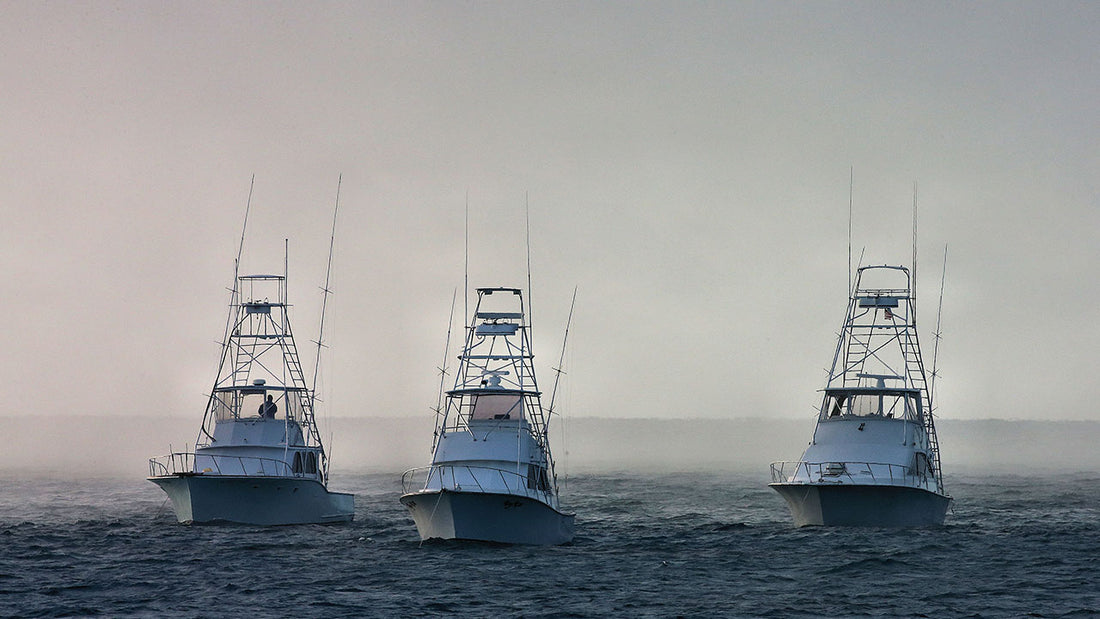
To Hire A Good Deckhand
Words by IGFA Hall of Fame Captain, Peter B. Wright
What makes a good deckhand?
Mark O'Brien and I were talking about the skills we looked for on how to hire a good deck hand after a young man had walked down the dock and asked us if we knew any captains who might be looking for help.
"If I could only ask one question of a prospective deckhand on my boat it would be, 'Can you throw a cast net?'" O'Brien said. Any young man who could throw a net probably also knew how to rig baits, tie knots, gaff fish, handle dock lines, check engines, and handle saltwater tackle like AFTCO AFTCO fishing gaffs, fishing gloves, and fishing harnesses. On top of all the other necessary skills he would be able to supply bait, especially live bait and live chum. It was unlikely a good net man lacked the other skills and the net skills alone were a major addition if all else were equal.
When I hire a good deckhand I have several criteria that must be met. First and foremost are social skills. It is not necessary that a candidate meet Emily Post or Martha Stewart standards. An occasional swear word is not grounds for termination. There are, however, a number of excellent fishermen and boat men who I simply can not hire because their language is not acceptable to my clients, or the client's wives. (I have to struggle with this after a long season in the company of rough, tough fishermen but try not to use foul language around ladies.)
Of equal importance is cleanliness, which is definitely "next to godliness" on boats. Fine finish work and fancy bright work are not essential on a hard working charter boat but a clean looking and smelling boat, especially the head, is paramount. No negotiation! I will clean a head if necessary, but a deckhand who leaves it to me soon leaves!
Intelligence is a must. Formal education can be minimal but innate intelligence is a needed to learn and understand the many tasks a fishing boat deckhand has to perform under extreme pressure and ever changing conditions. I can honestly say I do not remember ever having a deckhand for any length of time who was not above average intelligence and capable of quickly learning complicated tasks.
If a deckhand is to become a seaman, not just a bait rigger, reading skills are essential along with enough mathematics to learn to navigate and handle basic business and engineering problems.

Fishing skills tend to transfer readily. It really does not matter what kind of fishing a new employee may have done in the past. From snook to trout, and albacore to tarpon most of the rudiments of finding and attracting fish have strong similarities. The prey and predator relationships of the target species and the bait (natural or artificial) used to entice them have enough similarities to enable a good fisherman for any species to rapidly learn how and where to catch another.
Even with no fishing experience, athleticism is more important than sheer brute strength. I would prefer a gymnast to a weight lifter, and quick reflexes are perhaps the greatest gift of all. (I have had clumsy deckhands who overcame their lack of agility through concentration, practice and dedication but it was never easy for them.)
Many of my best wire men have not been exceptionally strong but have been able to competently and confidently take the leader on marlin and tuna running up to 1,000 pounds. They were able to release the leader cleanly when needed and instantly grab it again with only a small loss of distance if I was able to maneuver the boat toward the fish quickly enough. (A muscle bound lummox breaks leaders and/or gets himself in danger!)
An average sized man who can do a series of chin ups has enough strength to pull up even a large bluefin or black marlin. A small man or average woman would need to build up their upper body strength to become a world class leader person. The ability to react with quick, agile movements is a universal trait in all top deckhands.
Vision is a highly prized attribute for most fisherman but concentration and dedication are even more important. Along with the proper performance fishing shirts, Polarized glasses are a must and corrective lenses can make many persons with poor vision well above average. What is often (incorrectly) taken as visual acuity is more often the ability to comprehend, through experience, the visual stimulus available to anyone bothering to look for it .
A cut off bait, the color of a fish under a bait, or the glint of a tail or fin at a distance, are only seen by the knowledgeable fisherman who has been trained to recognize them. (Doctors instantly recognize things in an X-Ray that we miss not because they can see better, but because they are trained to see and recognize things not recognized by the rest us.)
A good captain can hire a good deckhand and train a novice to become a great deckhand.






